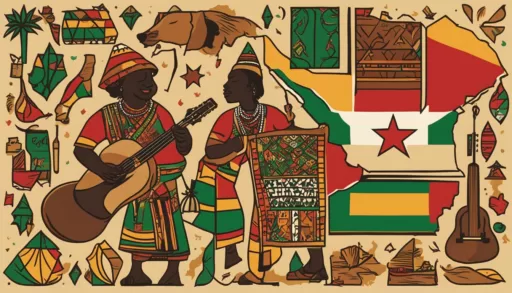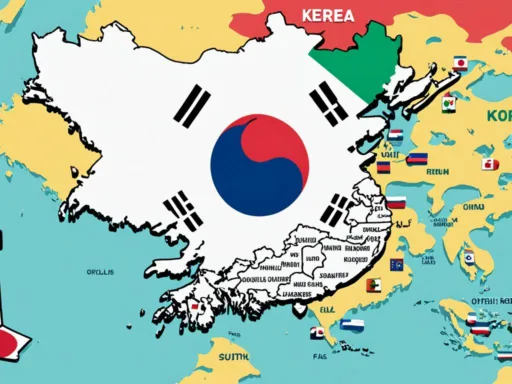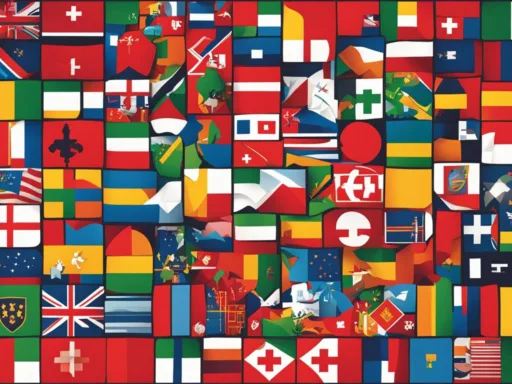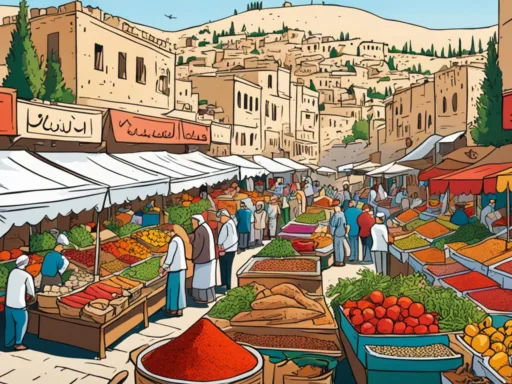Steeped in cultural richness, Burkina Faso is a bastion of linguistic diversity that boasts an impressive tapestry of tongues. In this West African nation, the languages spoken in Burkina Faso reflect its pluralistic society where an estimated 70 languages are actively used, with around 66 of these being indigenous to the region. The official language trimming the edges of its legal, educational, and public domains is none other than French—a vestige of its colonial past that continues to serve as a beacon of instruction within its classrooms. Yet, it’s essential to note that for the majority of Burkinabés, French is seldom the go-to language for daily interactions.
On the ground, languages like Mooré and Dyula echo through the bustling streets and marketplaces, knitting communities together and facilitating commerce. Mooré, in particular, commands a presence as it resonates with over half the population, especially around the pulsing heart of the nation, the capital city of Ouagadougou. Augmenting the communicative landscape, the deaf community finds voice and understanding through West African Sign Language and Burkina Sign Language.
Key Takeaways
- French, while the official language of Burkina Faso, is used regularly by less than 15% of the population.
- Around 70 languages are spoken in Burkina Faso, with the majority being indigenous languages.
- Mooré acts as a de facto lingua franca, particularly in central Burkina Faso around Ouagadougou.
- Dyula is an important language for trade, especially in the western regions of the country.
- The deaf community in Burkina Faso utilizes American and Burkina Sign Language for communication.
A Melting Pot of Languages in Burkina Faso
The mosaic of regional languages in Burkina Faso paints a vivid picture of the country’s rich cultural heritage and complex social fabric. With an eclectic collection of roughly 70 tongues, including a myriad of indigenous languages of Burkina Faso, the nation’s linguistic landscape is as varied as it is vibrant. In every corner of Burkina Faso, from the buzz of urban centers to the quietude of rural communities, language acts as a living testament to diversity and tradition.
The Linguistic Landscape of Burkina Faso
Amidst the soundscape of Burkina Faso, where conversations ebb and flow, there is a remarkable blend of dialects and languages that characterize the daily life of its citizens. Beyond the official language, there are local sounds and expressions ranging from the harmonious tones of Mande languages to the rhythmic cadences of Gur languages – each reflecting the areas they are most ardently spoken.
Indigenous and National Languages Overview
Local ecosystems of communication are etched across Burkina Faso, with ethnic and traditional languages of Burkina Faso forming the backbone of many community interactions. From the central heartlands where Mooré commands significant influence, to the western trade hubs where Dyula facilitates commerce, each language group contributes its voice to the national narrative.
Prevalence of Ethnic Languages in Local Communities
Venturing into more remote regions, the tapestry becomes even more complex. Languages such as Fula serve as a common thread in the north, ensuring cohesion and understanding. Meanwhile, the rhythmic inflections of Gourmantché fill eastern airwaves, and the fluid Bissa dialogue rises from the south, symbolizing the essence of a multi-ethnic, multilingual Burkina Faso.
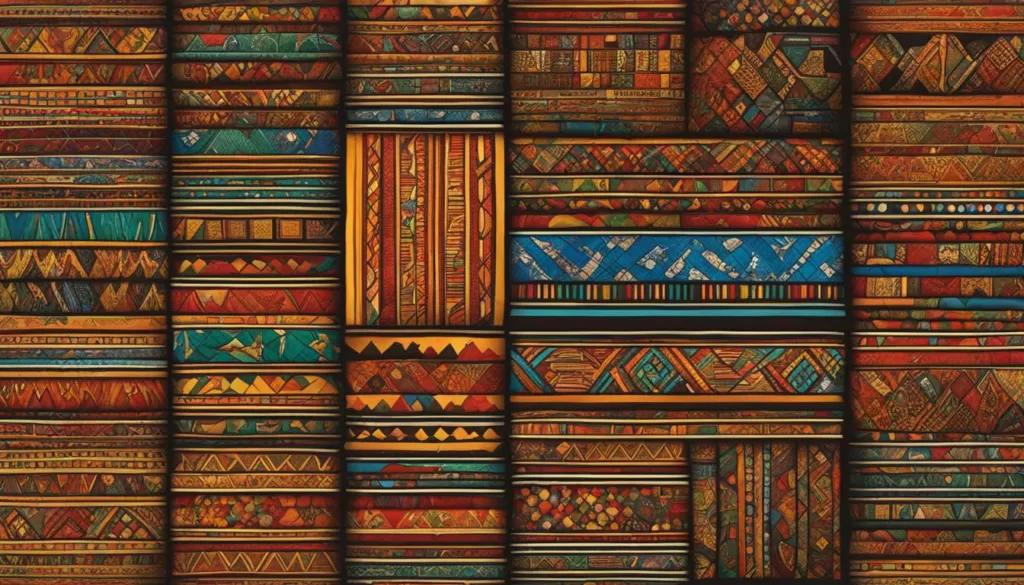
The country is not just a crossroads for a variety of languages but also an incubator for multilingualism, especially within its bustling urban centers. Here is a closer look at the indigenous languages of Burkina Faso, laid out to showcase their prevalence throughout the country:
| Language | Region | Percentage of Speakers |
|---|---|---|
| Mooré | Central Burkina Faso | 52.5% |
| Dyula | Western Burkina Faso | Prevalent in trade regions* |
| Fula | North and widespread | Lingua franca in many areas |
| Gourmantché | Eastern Burkina Faso | Notable presence |
| Bissa | South | Strong presence |
This comprehensive view of the linguistic makeup of Burkina Faso demonstrates just how deeply language is woven into the nation’s cultural quilt and how the use of these languages perpetuates the traditions and values of the Burkinabé people. The journey through Burkina Faso’s linguistic terrain becomes a passage through heritage, identity, and the spirit of human expression.
French as Burkina Faso’s Official Language
In Burkina Faso, French stands as the cornerstone of official discourse—a language that has permeated the nation’s fabric since the colonial era of 1919. As one of the principal official languages Burkina Faso recognizes, French commands a unique position, underlying the operations of the government, the workings of the judiciary, and the many public services available to citizens.

Yet, despite its formal status, the French language finds itself in a paradoxical role within the everyday lives of the Burkinabé people. Less than 15% of the population engage in French for their day-to-day communication. Instead, it serves primarily as an aspirational conduit—a means to achieve social mobility and to open doors in global arenas. The commitment to the French language, therefore, remains steadfast, particularly within the realm of French language education in Burkina Faso.
With its position as the language of instruction from primary schools to higher education, French is both revered and essential. Its continued endorsement by educational policy-makers and external funders is indicative of a collective recognition of its value in fostering economic and academic advancement. In these ways, French is more than a relic of colonial times, it is a lever towards future prosperity for the nation and its individuals alike.
“French is not just a language; it’s an opportunity. An opportunity that opens up the world beyond Burkina Faso to our children.”
This robust support for French in education illustrates an interesting interplay between retaining a colonial language for its benefits while nurturing the rich tapestry of local cultures through multilingualism. It is through the dense foliage of its many languages that Burkina Faso continues to cultivate its identity, anchored firmly by the French language’s extensive roots.
Diving into the National Languages of Burkina Faso
In the heart of West Africa, Burkina Faso stands out for its linguistic repertoire, claiming a significant cultural checkpoint in terms of popular languages Burkina Faso harbors. The multilingual rhythm of the country is set by its remarkable national languages, each bearing distinctive features that enrich the collective identity. Let’s delve into the major national languages that give color and contour to the Burkinabé sociolinguistic landscape.
The Dominance of Mooré
Regal in its prevalence, the Mooré language is not only widely spoken but also serves as a socio-cultural linchpin, especially in the vicinity of Ouagadougou. Its resonant tones and syntax are emblematic of the country’s vibrant core, where it furnishes a lingua franca for a substantial portion of the population. The significance of the Mooré language in Burkina Faso lies not only in its numerical superiority but also in its role in unifying diverse ethnic groups under a shared communicative umbrella.
Dyula: A Lingua Franca of Trade
The language of commerce and trade, Dyula, echoes in the markets and trading posts, particularly pronounced in Western Burkina Faso. This language has become a vital vehicle for business, proving indispensable in cities like Bobo-Dioulasso, where trade thrives. Its utility spreads far beyond the realm of finance, marking Dyula as a cultural and economic bridge between communities.
The Wide Reach of Fula Across Regions
Spanning wide across the northern and eastern enclaves, the Fula language Burkina Faso sees encompasses a vast array of regional dialects. It transcends mere communication, symbolizing a broader kinship and shared heritage among the Fula-speaking populations. Its widespread use as a lingua franca spotlights the Fula language’s unique capacity to navigate diverse linguistic terrains with fluency and adaptability.

The linguistic ecosystem in Burkina Faso is thus characterized by a tapestry weaved through the strong threads of Mooré, Dyula, and Fula. These languages, with their dialects and idiosyncrasies, form a pivotal part of the nation’s identity, historical journey, and daily life. They are more than mere means of communication—they are vital components of a rich cultural patrimony, respected and celebrated across the country.
Understanding the Role of French in Education and Media
The influence of French in Burkina Faso transcends beyond its colonial ties, embedding itself significantly in the realms of education and mass communication. Amidst a landscape teeming with ethnic languages in Burkina Faso, the continued prominence of French within these sectors speaks volumes about its dual function: as a key to unlocking a multitude of opportunities, and a medium cutting across the multilingual fabric of Burkinabé society.
French in Education: A Gateway to Opportunity
French language education in Burkina Faso stands as a gateway to higher learning and global engagement. Despite the fact that a modest fraction of the population uses French in casual settings, its role as the main language of instruction is undisputed. By equipping students with proficiency in French, Burkina Faso nurtures a pathway not only towards academic success but also towards the broader vistas of international discourse and commerce. This strategic focus on French fortifies the nation’s commitment to empowering its youth, preparing them for the dynamic demands of the global stage.
Media and Communication: French Amidst Multilingualism
In the sphere of mass media, French carves out a critical role alongside the vibrant cacophony of multilingual media in Burkina Faso. It coexists with a dozen other languages on the country’s airwaves, reinforcing its relevance even as it rubs shoulders with a plethora of national and indigenous dialects. This symbiosis between French and the various ethnic languages in Burkina Faso not only showcases a cultural balancing act but also underscores a commitment to inclusivity and access — ensuring that information reaches every stratum of society, no matter the linguistic preference.
FAQ
What languages are spoken in Burkina Faso?
Burkina Faso boasts a rich linguistic diversity with around 70 languages spoken. French is the official language, and indigenous languages such as Mooré, Dyula, and Fula are widely spoken among various ethnic groups. Other languages include Gourmantché, Bissa, and regional dialects.
What is the linguistic landscape of Burkina Faso?
The linguistic landscape of Burkina Faso is a mosaic of languages spoken by different ethnic communities within the region. Indigenous languages and dialects are the fabric of its cultural identity, deeply rooted in tradition and everyday communication.
Which indigenous and national languages are prominent in Burkina Faso?
Indigenous languages such as Mooré and Dyula hold prominent positions within Burkina Faso. Mooré is considered by many as a de facto lingua franca, especially around the capital, Ouagadougou. Dyula is instrumental in trade across western regions, while Fula is a lingua franca in the north and east.
How prevalent are ethnic languages in local communities?
Ethnic languages in Burkina Faso are very much alive and form the primary mode of communication in many local communities. Each ethnic group often speaks its own language, such as Gourmantché in the east or Bissa in the south, contributing to the country’s rich cultural diversity.
Why is French considered the official language of Burkina Faso?
French has been the official language of Burkina Faso since colonial times, and it remains the language of administration, education, and media. Despite this, it’s the primary spoken language for a relatively small portion of the population.
What is the dominance of Mooré within Burkina Faso’s national languages?
Mooré is one of the most widely spoken national languages in Burkina Faso, especially in and around the central regions and the capital. It functions as a lingua franca, bridging communication across different ethnic groups within these areas.
What role does Dyula play as a lingua franca of trade?
Dyula is a language of commerce and is especially prevalent in the western trade circuits of Burkina Faso, as well as in urban centers. It enables traders from diverse linguistic backgrounds to communicate effectively, which is crucial for economic interactions.
Can you describe the wide reach of Fula across regions in Burkina Faso?
Fula, or Fulfulde, has a sprawling reach that extends into the northern and eastern regions of Burkina Faso, where it’s commonly used. It’s not only spoken within the Fula community but also serves as a lingua franca among various other ethnic groups in these areas.
How does French in education serve as a gateway to opportunity?
French is the primary language of instruction in schools across Burkina Faso, which opens up access to higher education and international opportunities for students. French language skills are often associated with social mobility and professional growth.
What is the role of French amid the multilingual media landscape of Burkina Faso?
In Burkina Faso’s multilingual media landscape, French plays a crucial role as one of the 13 languages broadcasted on the radio. Despite the prevalence of local languages, French remains central in news, information dissemination, and as a tool for creating a shared space for national dialogue.
